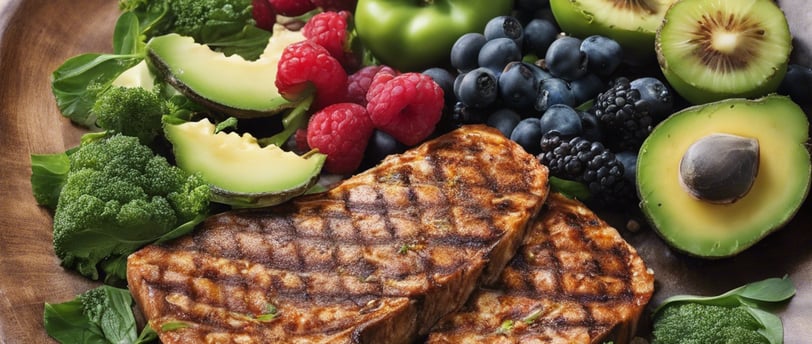Fueling Your Workout: The Importance of Pre-Workout Nutrition
Fueling Your Workout: The Importance of Pre-Workout Nutrition
Fitness Protection Plan
1/14/20243 min read


What to Eat Before Working Out
When it comes to getting the most out of your workout, what you eat before hitting the gym can make a significant difference. Pre-workout nutrition plays a crucial role in providing your body with the necessary fuel to perform at its best. Whether you're a seasoned athlete or a fitness enthusiast, understanding what to eat before working out can help you maximize your performance and achieve your fitness goals.
Why is Pre-Workout Nutrition Important?
Pre-workout nutrition is essential for several reasons. First and foremost, it provides your body with the energy it needs to power through your workout. The food you consume before exercising serves as a source of fuel, supplying your muscles with the necessary nutrients to perform at their peak.
Additionally, pre-workout nutrition helps optimize your performance by enhancing your endurance, strength, and overall exercise capacity. It can also improve your focus, concentration, and mental alertness during your workout, allowing you to push harder and train more effectively.
Moreover, pre-workout meals or snacks can help prevent muscle breakdown and promote muscle growth and repair. By providing your body with the right nutrients, you can support muscle protein synthesis and recovery, ultimately leading to better results from your training sessions.
The Best Types of Foods to Eat Before a Workout
When it comes to pre-workout nutrition, it's crucial to choose foods that are rich in carbohydrates, moderate in protein, and low in fat and fiber. Carbohydrates are the primary source of energy for your muscles, and consuming them before a workout can help replenish glycogen stores and provide a readily available source of fuel.
Some excellent pre-workout food options include:
- Whole grain toast with nut butter and sliced banana
- Oatmeal topped with berries and a sprinkle of nuts
- Greek yogurt with granola and fresh fruit
- Chicken or turkey breast with sweet potatoes or brown rice
- Smoothie made with fruits, vegetables, and a scoop of protein powder
These foods provide a combination of carbohydrates, protein, and essential nutrients to fuel your workout and support muscle recovery.
How Long Before a Workout Should You Eat?
The timing of your pre-workout meal or snack is crucial to ensure optimal digestion and absorption of nutrients. Ideally, you should aim to eat a balanced meal or snack containing carbohydrates and protein about 1-3 hours before your workout.
Eating too close to your workout may cause discomfort, as your body will be busy digesting the food rather than focusing on the exercise. On the other hand, eating too far in advance may leave you feeling hungry or lacking energy during your workout.
Experiment with different timings to find what works best for you. If you're short on time, a small snack containing easily digestible carbohydrates, such as a piece of fruit or a protein shake, can be consumed 30-60 minutes before your workout.
Specific Foods to Avoid Before Exercising
While it's important to fuel your body before a workout, there are certain foods you should avoid consuming too close to your exercise session. These foods can cause digestive discomfort, sluggishness, or even interfere with your performance.
Avoid the following foods before working out:
- High-fat foods: Foods high in fat take longer to digest and can cause discomfort during exercise.
- High-fiber foods: Foods high in fiber, such as beans, broccoli, or bran cereals, can cause bloating and gas.
- Spicy foods: Spicy foods can lead to heartburn or indigestion during your workout.
- Large meals: Consuming a large meal too close to your workout can make you feel sluggish and may lead to stomach cramps.
- Sugary snacks: While a small amount of sugar can provide a quick energy boost, consuming too much can lead to a sudden energy crash.
It's important to listen to your body and avoid any foods that you know don't sit well with you personally.
The Influence of Workout Type on Pre-Workout Nutrition
The type of workout you're planning can also influence what you should eat beforehand. Different exercises place varying demands on your body, and tailoring your pre-workout nutrition accordingly can optimize your performance.
For endurance activities such as long-distance running or cycling, focus on consuming carbohydrates for sustained energy. Incorporate foods like whole grains, fruits, and starchy vegetables into your pre-workout meal or snack.
If you're engaging in strength training or high-intensity interval training (HIIT), including a moderate amount of protein in your pre-workout nutrition can support muscle repair and growth. Lean protein sources like chicken, fish, or Greek yogurt can be beneficial.
Ultimately, finding the right balance of macronutrients and timing for your specific workout type and personal preferences will help you achieve optimal results.
Conclusion
Proper pre-workout nutrition is a key component of any effective fitness routine. By fueling your body with the right foods before a workout, you can enhance your performance, improve endurance, and support muscle growth and recovery. Remember to choose foods that are rich in carbohydrates, moderate in protein, and low in fat and fiber. Experiment with different timings and listen to your body to find what works best for you. With the right pre-workout nutrition, you'll be well on your way to achieving your fitness goals.
